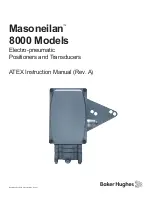
–
–
–
–
30
31
Product Labeling
The end product must be labeled to meet the FCC and IC product label
requirements. It must have the below or similar text:
Contains FCC ID: OJMTRM900TTA / IC: 5840A-TRM900TTA
The label must be permanently affixed to the product and readily visible to
the user. ‘‘Permanently affixed’’ means that the label is etched, engraved,
stamped, silkscreened, indelibly printed, or otherwise permanently marked
on a permanently attached part of the equipment or on a nameplate of
metal, plastic, or other material fastened to the equipment by welding,
riveting, or a permanent adhesive. The label must be designed to last
the expected lifetime of the equipment in the environment in which the
equipment may be operated and must not be readily detachable.
FCC RF Exposure Statement
To satisfy RF exposure requirements, this device and its antenna must
operate with a separation distance of at least 20cm from all persons and
must not be co-located or operating in conjunction with any other antenna
or transmitter.
Antenna Selection
Under FCC and Industry Canada regulations, this radio transmitter may
only operate using an antenna of a type and maximum (or lesser) gain
approved for the transmitter by the FCC and Industry Canada. To reduce
potential radio interference to other users, the antenna type and its gain
should be so chosen that the equivalent isotropically radiated power
(e.i.r.p.) is not more than that necessary for successful communication.
The TRM-900-TT radio transmitter has been approved by the FCC and
Industry Canada to operate with the antenna types listed in Figure 21 with
the maximum permissible gain and required antenna impedance for each
antenna type indicated. Antenna types not included in this list, having a
gain greater than the maximum gain indicated for that type, are strictly
prohibited for use with this device.
Conformément à la réglementation d’Industrie Canada, le présent émetteur
radio peut fonctionner avec une antenne d’un type et d’un gain maximal
(ou inférieur) approuvé pour l’émetteur par Industrie Canada. Dans le but
de réduire les risques de brouillage radioélectrique à l’intention des autres
utilisateurs, il faut choisir le type d’antenne et son gain de sorte que la
puissance isotrope rayonnée équivalente (p.i.r.e.) ne dépasse pas l’intensité
nécessaire à l’établissement d’une communication satisfaisante.
Le présent émetteur radio (TRM-900-TT) a été approuvé par Industrie
Canada pour fonctionner avec les types d’antenne énumérés la Figure 21
et ayant un gain admissible maximal et l’impédance requise pour chaque
type d’antenne. Les types d’antenne non inclus dans cette liste, ou dont le
gain est supérieur au gain maximal indiqué, sont strictement interdits pour
l’exploitation de l’émetteur.
Antennas / Antennes
Linx Part Number
Référence Linx
Type
Gain
Impedance
Impédance
ANT-916-CW-QW
¼ Wave Whip
1.84dBi
50
Ω
ANT-916-PW-LP
¼ Wave Whip
2.44dBi
50
Ω
ANT-916-SP
Planar
1.35dBi
50
Ω
ANT-916-WRT-RPS
½ Wave Dipole Helical
1.83dBi
50
Ω
ANT-916-CHP
¼ Wave Whip
1.34dBi
50
Ω
ANT-916-CW-HW
½ Wave Dipole Helical
1.83dBi
50
Ω
Cable Assemblies / Assemblages de Câbles
Linx Part Number
Référence Linx
Description
CSI-RSFB-300-UFMR* RP-SMA Bulkhead to U.FL with 300mm cable
CSI-RSFE-300-UFMR* RP-SMA External Mount Bulkhead to U.FL with 300mm cable
* Also available in 100mm and 200mm cable length
Figure 21: TT Series Approved Antennas
Содержание MDEV-900-TT
Страница 1: ...TT Series Remote Control Transceiver Data Guide...
Страница 7: ...8 9...










































